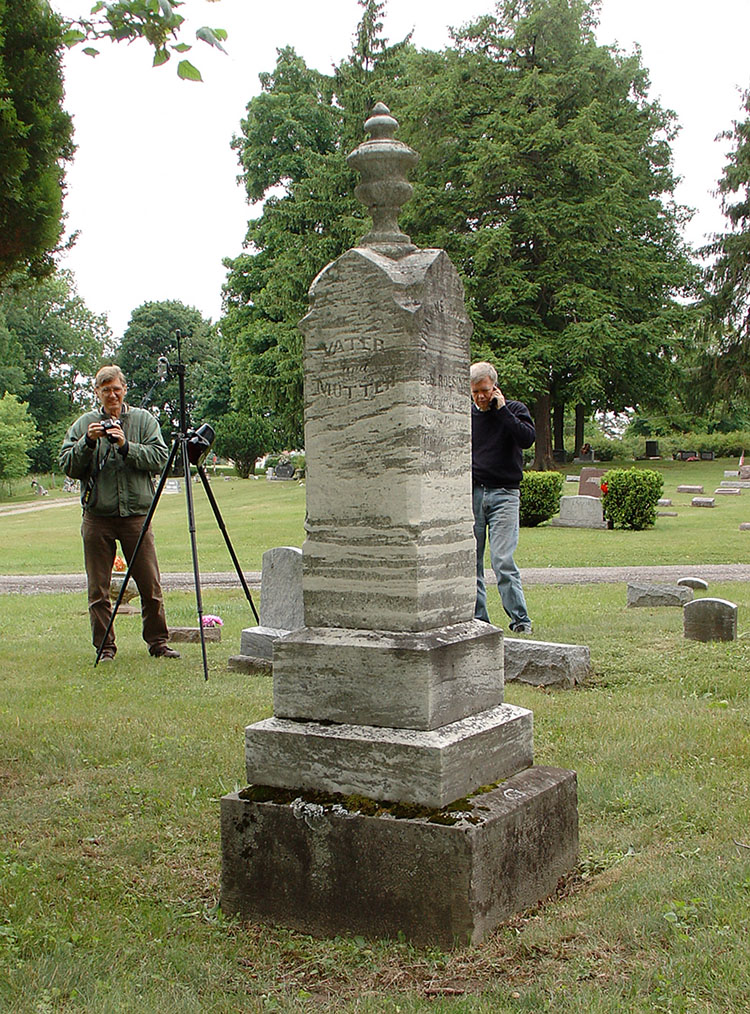The Mueller family had been in its new home less than half a year when it suddenly faced disaster. Fritz Mueller, age 44, died on May 6, 1866, and the family soon learned that all the land they had bought was encumbered by an undisclosed lien. They lost almost everything.
Rev. Herbert C. Mueller, Fritz Mueller’s great-grandson who translated most of this emigration journal, thought that Fritz Mueller died believing himself to be a very wealthy man. No one knows for certain whether that was the case. It seems unlikely that such a large swindle would not have been noticed for six months.
Details about the swindle are difficult to evaluate. One family tradition pointed to a scheme involving a corrupt land agent whose co-conspirator was a Lutheran minister. Another cited a banker named Mitchell. Different accounts were embellished over time, additional details recalled or invented — e.g., the minister was seen to be driving a new horse and carriage after the sale. A common thread in family traditions is that the land Fritz bought — 560 acres, nearly a full section, with 300 acres of prime farmland ready for planting and a large sawmill on the premises — was encumbered by an undisclosed lien. Fritz paid cash, which quickly disappeared, and his title proved nearly worthless because the land carried a debt equivalent to its full value. After settlling with the lienholder, the Mueller family — Johanne and her nine children — was left with 108 acres under a heavy mortgage.
The archive has no record of the price Fritz paid, but there is some idea of the financial resources he had. Fritz’s grandson Otto, whose father worked the farm and eventually owned the 108 acres free and clear, later wrote that the Mueller family arrived in America with $39,000 in gold — roughly $656,324 in 2021 dollars. Family lore says the gold was packed into a large leather moneybelt worn by Fritz’s wife Johanne. While Johanne did indeed wear a money belt with gold in it, Fritz wrote that he transferred most of his wealth through banks, brokerages and merchants. (The U.S. official gold price was $20.67 an ounce in 1865; $39,000 worth would have weighed a bit more than 117 pounds.) Fritz did write that transferring his wealth to the New World was an expensive proposition:

Vater und Mutter Fritz, 44, may have died believing himself to be a wealthy man. Johanne and their children soon learned they had been swindled of almost everything. The four Nickel Boys visited in June 2007.
With the rich merchants hailing from Bremen, from whom I picked up my money, how did things fare? They showed a very friendly face, squeezed my hand to be sure. But such a handshake cost me a lot of money. They deducted one percent of my money — commission, provision, staffing, and however the brokerage fees may be called, in addition. The House of Bremen had not given me exchange, but only a statement of my money, so I could not complain. ... I warn everyone against exchange. Take your money along in bonds or in cash, then you need not allow yourself to be taken advantage of.
As for Fritz’s death, the archive has no conclusive information. By one account, he was severely injured while helping a neighbor manage a troublesome horse. He was in great pain for more than two weeks before his death. He and Johanne are buried in the German section of Lakeland Cemetery, the Kendallville town burial ground, and not in the churchyard. The Mueller family was under discipline because of an episode of outspokeness on Fritz’s part, so the minister refused to conduct the funeral or bury him.

